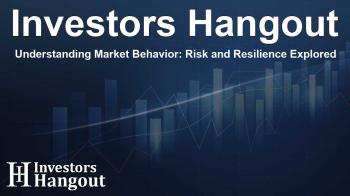Understanding Market Behavior: Risk and Resilience Explored

When Markets Go Awry
Markets can act unpredictably, often catching us by surprise. The extent of this unpredictability often relates to the sturdiness of market structures and the level of prevalent overconfidence.
The Impact of Benoit Mandelbrot's Insights
One pivotal moment in understanding market behaviors was the release of Benoit Mandelbrot's book, The (Mis)behavior of Markets. This book revealed deep insights into market dynamics, provoking thought and discussion amongst many. I vividly recall immersing myself in this book, unable to stop reading as I sat in my car.
Key Takeaways from Mandelbrot
The crux of Mandelbrot's argument is simple yet profound: markets can experience significant drops without clear external triggers. The structural dynamics are complex and fractal, meaning abrupt market changes are often an intrinsic characteristic. We may look for explanations such as Federal Reserve missteps or inflation concerns, but these often overlook the root issue—the unstable nature of market frameworks.
The Illusion of Stability
For extended periods, markets might appear stable and manageable. Modifications, such as interest rate cuts or quantitative easing, can seem to keep everything in line. Many investors feel confident that their positions are safe. However, this feeling of control is misleading.
The Dangers of Overconfidence
Without warning, markets can shift dramatically and misbehave. They are capable of substantial downturns, placing even the most confident investors at risk. In nature, we see this—calm seas can suddenly betray us with immense rogue waves.
The Role of Structural Integrity
The reliability of a market, much like that of a ship, is crucial during turbulent times. A well-constructed vessel can weather severe waves, while a dilapidated one will fail under pressure. Similarly, the conviction of crew and passengers can heavily influence outcomes. If those involved firmly believe in the soundness of their investment, the fallout from any failure can be shocking.
Current Market Sentiment
Today, many believe the stock market is robust and capable of surviving even the fiercest financial tempests. However, this consensus could be dangerously misleading. What if we are all aboard a creaky vessel made to look appealing with a fresh coat of paint?
The Consequences of Bubbles
When the prevailing sentiment is that the market is unbreakable, investors may feel compelled to “buy the dip” after short-term declines, believing it's the safest route to profit. This perspective, while tempting, often results in recency bias; the phrase has become a familiar mantra after years of market gains.
Staying in the Comfort Zone
Many investors might hesitate to abandon perceived safety in the market for cautious measures. This reliance can lead to severe consequences when markets do falter. The collective belief in continued growth can make individuals overlook cracks in the foundation.
Learning from Past Bubbles
Reflecting on the dot-com bubble can reveal key lessons. This phenomenon occurred in a time driven by technological optimism, yet it serves as a reminder of the fragility of overconfidence. I attended major tech conferences during this era, where the frenzy to trade stocks was palpable among attendees.
The Cycle of Euphoria and Crash
If we analyze the market trends during such speculative excesses, we see sharp surges as eager investors rush to buy after downturns. However, euphoria can mask the deeper realities, and after a series of booms and crashes, significant losses often follow. The reality check hits hard, emphasizing the need for caution.
Accepting Market Realities
In conclusion, markets can misbehave unexpectedly, and their behavior is often influenced by structural soundness and prevailing attitudes. Recognizing the fine line between confidence and overconfidence is crucial for anyone navigating the financial landscape.
Frequently Asked Questions
What does it mean when markets misbehave?
Markets misbehaving refers to instances where they experience significant drops without apparent external causes, often linked to structural instability and investor psychology.
Why is market stability considered an illusion?
Investment stability may seem secure during calm periods, but unexpected market shifts can expose underlying vulnerabilities.
How do human emotions impact market behavior?
Investor confidence and collective sentiment can lead to trends like “buying the dip,” resulting in risky behaviors and potential losses.
What historical events demonstrate market bubbles?
The dot-com bubble of the late 1990s is a prime example, highlighting how euphoria can obscure the reality of market fundamentals.
How can investors prepare for potential market downturns?
Investors can prepare by conducting thorough research, maintaining a diverse portfolio, and being cautious of market sentiment shifts.
About The Author
Contact Riley Hayes privately here. Or send an email with ATTN: Riley Hayes as the subject to contact@investorshangout.com.
About Investors Hangout
Investors Hangout is a leading online stock forum for financial discussion and learning, offering a wide range of free tools and resources. It draws in traders of all levels, who exchange market knowledge, investigate trading tactics, and keep an eye on industry developments in real time. Featuring financial articles, stock message boards, quotes, charts, company profiles, and live news updates. Through cooperative learning and a wealth of informational resources, it helps users from novices creating their first portfolios to experts honing their techniques. Join Investors Hangout today: https://investorshangout.com/
The content of this article is based on factual, publicly available information and does not represent legal, financial, or investment advice. Investors Hangout does not offer financial advice, and the author is not a licensed financial advisor. Consult a qualified advisor before making any financial or investment decisions based on this article. This article should not be considered advice to purchase, sell, or hold any securities or other investments. If any of the material provided here is inaccurate, please contact us for corrections.

